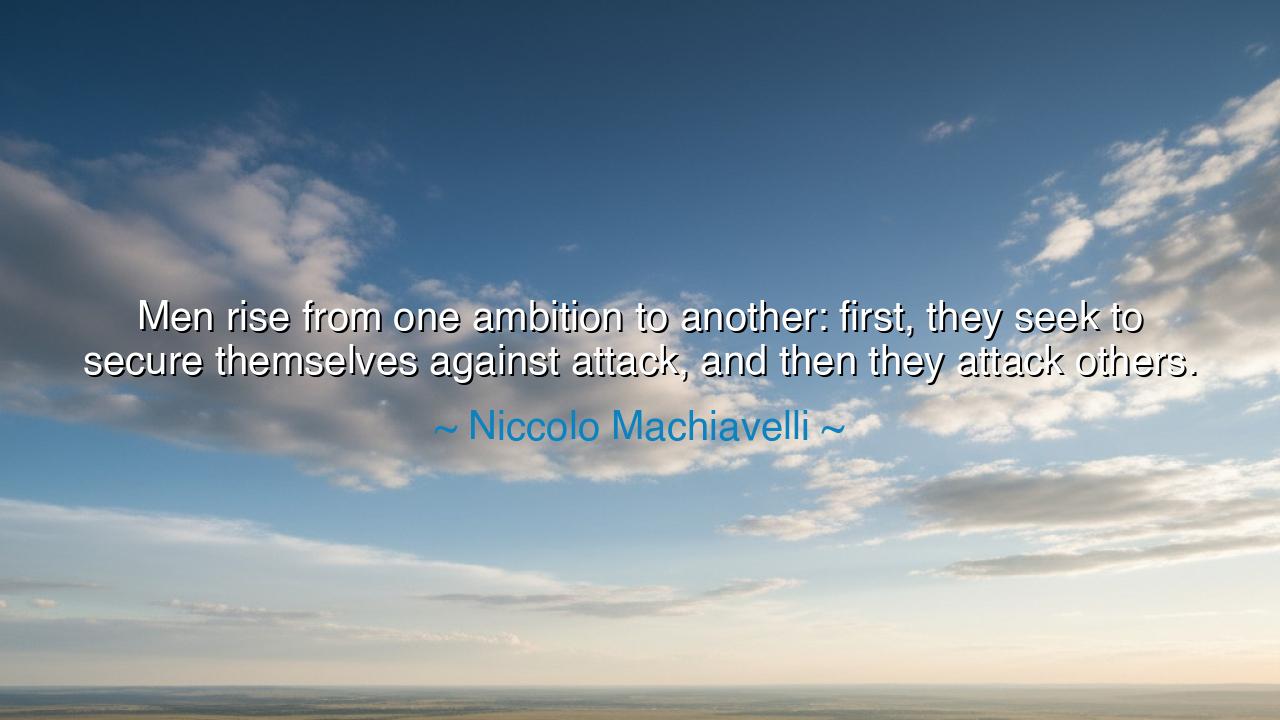
Men rise from one ambition to another: first, they seek to secure
Men rise from one ambition to another: first, they seek to secure themselves against attack, and then they attack others.






The words of Niccolò Machiavelli, “Men rise from one ambition to another: first, they seek to secure themselves against attack, and then they attack others,” echo with the sharp clarity of truth forged in the fire of human nature. Machiavelli, the Florentine thinker and statesman, was no mere cynic; he was an observer of men in their rawest form—unmasked by power, driven by desire, guided not by virtue but by necessity. In this brief yet piercing statement, he unveils the cycle of ambition that governs both rulers and ordinary men: the unending climb from fear to dominance, from defense to conquest.
At its heart, this quote is not only about politics—it is about the restless hunger of the human spirit. Man begins his journey with the desire for safety. He builds walls, gathers allies, and learns the art of self-preservation. Yet once he feels secure, the fire of ambition awakens. He is no longer content to be safe; he longs to be powerful. What once was caution becomes aggression. What began as defense transforms into conquest. This is the eternal paradox Machiavelli reveals: that security breeds desire, and desire, when untempered by wisdom, turns to domination.
In the world of Renaissance Italy, Machiavelli saw this truth play out daily among princes and republics. Florence, Venice, Milan—each began by seeking protection against the ambitions of others, only to become aggressors themselves when fortune turned in their favor. He watched as small city-states, once humble and fearful, rose to greatness through cunning and strength, and then fell again when their ambition outgrew their prudence. From these turbulent times, he learned that ambition is both the engine of greatness and the seed of ruin. It lifts men to power, but, left unchecked, it drives them to destroy what they once built to protect.
We see the same truth in the story of Alexander the Great. As a young prince, Alexander sought only to secure his father’s kingdom of Macedonia from rival powers. But when victory crowned his early campaigns, ambition transformed him. He could not stop at defense; he had to conquer Persia, Egypt, India—the known world itself. He achieved glory beyond imagination, yet his empire, born of conquest, shattered soon after his death. Alexander’s life embodies Machiavelli’s insight: the moment a man’s fear gives way to ambition, he risks being consumed by the very force that raised him. The will to protect becomes the will to possess.
Machiavelli does not condemn this pattern; he merely reveals it. To him, ambition is neither good nor evil—it is natural, an inseparable part of man’s nature. Yet wisdom, he implies, lies in knowing this truth and mastering it rather than being mastered by it. A leader must understand that the urge to expand, to dominate, to grasp for more, will always whisper within him. If he is wise, he will temper this desire with reason, remembering that power, once gained, must be governed with restraint. If he is foolish, he will chase ambition endlessly, believing each victory to be his last, until fortune turns against him and casts him down.
The ancient philosophers understood this same lesson. Aristotle warned that the measure of a great soul is not how much it conquers, but how much it can endure without being corrupted. Marcus Aurelius, the philosopher-emperor, wrote in his meditations: “Ambition means tying your well-being to what other people say or do.” Both men, like Machiavelli, recognized that unbridled ambition is a subtle form of slavery—it makes a man restless even in triumph, always fearing loss, always reaching for what lies beyond his grasp. The wise man, therefore, seeks not endless victory, but balance: the strength to defend, and the humility to stop conquering when enough has been gained.
So let this teaching be passed down: beware the transformation of fear into greed, of caution into conquest. Defend what is yours with wisdom, but do not let ambition harden your heart. Remember that peace is the highest victory, and restraint the rarest form of power. The man who learns to stop when he is safe, to rest when he has enough, to protect rather than to dominate—he alone escapes the endless ascent from defense to destruction. For as Machiavelli teaches, ambition is like a flame: it begins by warming the soul, but left untended, it consumes all in its path. And only the wise learn when to let that fire burn, and when to let it rest.






AAdministratorAdministrator
Welcome, honored guests. Please leave a comment, we will respond soon